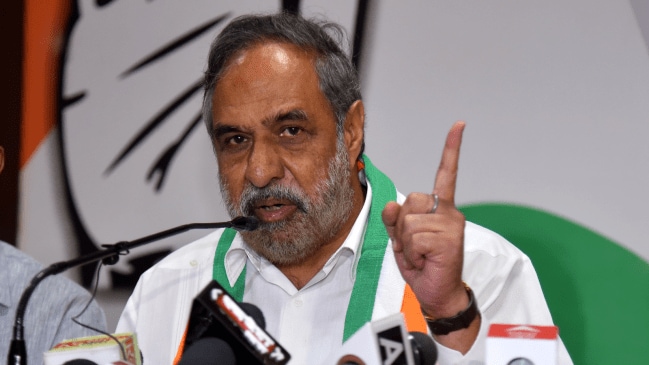All-party teams: Congress member Anand Sharma hails ‘important initiative’, party dubs them ‘diversion’
“We’ve been restrained… It was time there was retaliation, but it was measured, calibrated, which was made clear by India… All-party teams will sensitise global opinion on Pak hand”: Anand Sharma
 Anand Sharma was the only one among the names given by the Congress that the government included in the seven multi-party delegations. (Source: File)
Anand Sharma was the only one among the names given by the Congress that the government included in the seven multi-party delegations. (Source: File) The Modi government’s decision to send all-party delegations to foreign capitals to explain India’s position on terrorism was “an important initiative”, necessary to “sensitise global public opinion” about the role of Pakistan in the same, senior Congress leader and former Union minister Anand Sharma has said.
Sharma, the only one among the names given by the Congress that the government included in the seven delegations, will travel to South Africa, Egypt, Qatar and Ethiopia in the coming days as part of his team.
Underlining that the Congress had given unequivocal support to the government for whatever action it took following the Pahalgam terror attack, and stood in solidarity with the Armed Forces, Sharma told The Indian Express: “It is important to sensitise global public opinion about the situation in our region created because of decades of cross-border terrorism, (by) terrorist groups which are funded, nurtured and sheltered by the Pakistani military establishment and, in particular, the ISI. India has bled. We have paid a heavy price. We have been restrained in our responses. Very few countries could have been… It was time that there was retaliation, but it was measured, it was calibrated, which was made clear by India.”
Like several senior Congress leaders, Sharma seemed to strike a different line from the party’s increasingly aggressive stance on Operation Sindoor. On Wednesday, Congress communications head Jairam Ramesh, who had earlier questioned the government over the party names it picked for the delegations, called the whole exercise a bid by Prime Minister Narendra Modi to “divert” attention.
After the 1950s, MPs from various political parties were sent in delegations to the UN in New York every October-November, Ramesh said, adding that it was Modi who ended this tradition when he became PM in 2014. “But now that he is desperate and his image globally has been shattered, he suddenly thought of such all-party delegations of MPs to visit different countries to divert attention from the tough questions he is being called to answer,” Ramesh said.
Listing the big terror attacks in India, Sharma told The Indian Express: “Even when Parliament of India was attacked, India was outraged, but still there was maturity and firmness. But the list is a long one… From Jammu to Udhampur, Pathankot, Chittisinghpora, Uri, Poonch, Pulwana and now Pahalgam. So there cannot be any equivalence between India and Pakistan. One is a promoter of terrorism – they have weaponised it as a part of their strategy – and India is a victim. It is important that the leadership of countries where our groups would be going are fully informed as to what the situation is.”
Pakistan had its backers, Sharma said, and “therefore the global community has to stand as one in the fight against terrorism”. “They cannot be selective. There cannot be an approach which has carve outs for some terror outfits in some countries. It is a global scourge. It must be eradicated. Long back we had moved a resolution against terrorism at the United Nations which some countries, including China, had prevented. There has to be coordinated action. Some actions have taken place like the FATF (Financial Action Task Force) to choke terror funding and flow of both resources and weapons. Much more is required to be done,” he said.
Sharma said that the all-party delegations would inform foreign countries of “India’s position and the ground realities as to how over decades these terror attacks have unfolded and the price which our people have paid”. “It would be wrong on the part of leaders of any country to think that it is only India’s problem. It is a global threat… Wherever in the world you have terrorist groups operating, they have to be neutralised. Otherwise, they pose a risk to civil societies and a threat to nation states,” he said.
Sharma, who was a Cabinet minister in the UPA government, also recalled how the Manmohan Singh government “mobilised and sensitised” the international community after the 26/11 Mumbai terror attacks. “Then also not only was there an outpouring of grief but also outrage. And the world understood the seriousness… every major country stood up. In the past, our leaders – both Rajiv Gandhi and P V Narasimha Rao – requested even (BJP stalwart) Atal Bihari Vajpayee to lead a group or be part of it,” Sharma said.
He added that on two occasions he had travelled with Vajpayee on such trips, and these brought together “leaders of various political parties… because India belongs to all of us and India speaks in one voice when India is the victim of terrorism”.
In reaction to Ramesh’s claim that the all-party delegations were a “diversionary tactic” by the Modi government, the BJP said the Congress was again “belittling” the government, and hurting efforts to convey India’s strong stand against Pakistan-sponsored terrorism.
BJP national spokesperson and Rajya Sabha MP Sudhanshu Trivedi said: “The Congress is forced to make such a statement in frustration as it is not being able to ask for proof (of Indian military action). Nationalism has completely vanished from the eyes of the Congress.”
Citing statements by not just Ramesh but also Congress president Mallikarjun Kharge and Rahul Gandhi, Trivedi said they seemed to be trying to outdo each other “in the race to gain popularity in Pakistan”. Ramesh’s remarks were an “insult” to all MPs, he said.




